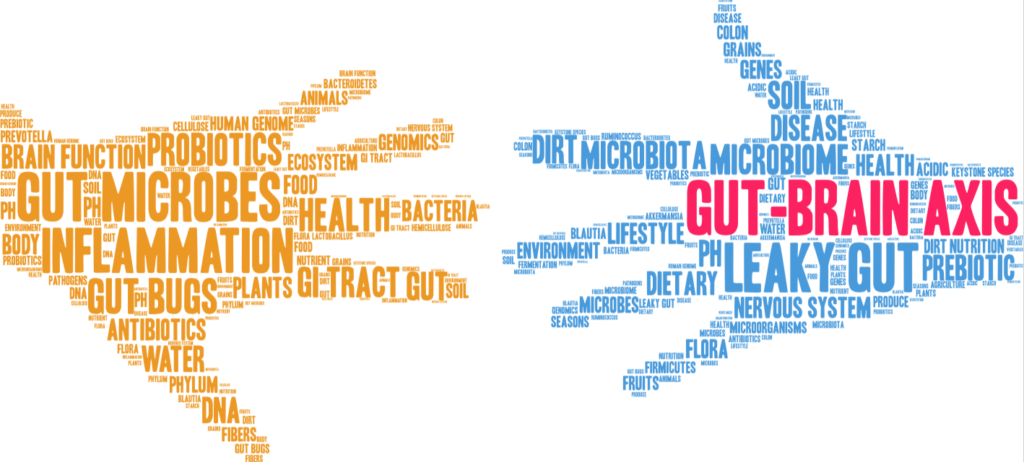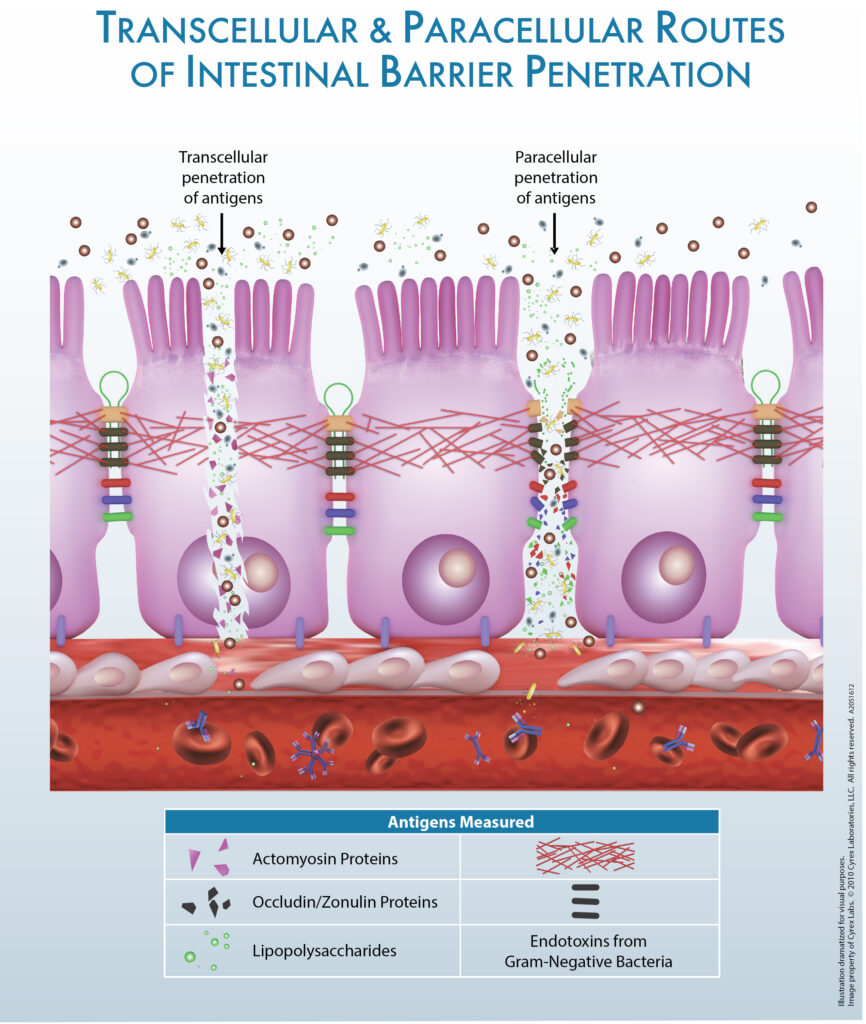
The COVID-19 pandemic, along with the onset of flu season, have a lot of people thinking about their immune systems, and seeking ways to improve resilience to viruses and other types of infection.
The best way to help patients strengthen their immunity is to work with them to optimize gut health and strengthen epithelial barriers.
A great deal of mainstream and integrative medicine research has been published on the importance of gut barrier integrity in health and disease, and particularly in chronic disease states. We now know far more than we once did about how the immune system and the gut are interconnected, and the ways in which immunological overload leads to chronic disease.
Approximately 70% of the immune system resides in the gut, and there are connections between the gut and the brain, all of which are influenced by the gut microbiome. Therefore, it is vital that we look at these interactions when working with patients to bolster their immunity.
Importantly, we now have tools for assessing gut barrier function, which can greatly improve our ability to guide our patients.
Preventing Toxin Translocation
Immunologist Aristo Vojdani, PhD, known as the father of functional immunology, is credited with revolutionizing the way barrier testing is done. Dr. Vojdani’s research has shown how environmental toxins, infections, and dietary proteins and peptides can compromise gut barrier function, leading to immune system dysregulation and, ultimately, to chronic systemic inflammation.
As Chief Scientific Advisor at Cyrex Laboratories, he has translated this research into a spectrum of clinical tests to help clinicians identify and address these problems.
Disruption of the gut epithelial barrier permits the unregulated translocation of gut contents into the lamina propria, which is where most of the immune cells, including lymphocytes and resident macrophages (stationary immune cells) reside.
When the barrier weakens to the point of allowing translocation of large food molecules, toxins, and microbes—the so-called “leaky gut syndrome”—this influx puts a significant strain on the immune system causing local and distant inflammation and autoimmunity.
Gut & Brain: As Below, So Above
The same factors that lead to GI barrier breakdown may also affect other barriers such as the blood-brain barrier (BBB). The BBB is comprised of specialized brain and vascular cells that prevent the unrestricted leakage of plasma proteins into the central nervous system. It acts as a regulatory interface between brain and blood, performing nutritive, homeostatic, and communication roles.
The keys to barrier integrity are the proteins– claudins, tricellulin, occludin, and zonula occludens—that comprise the tight junctions between endothelial cells. These proteins restrict paracellular diffusion of potentially noxious substances.
Disruption of these tight junctions can lead to a leaky BBB. Structural and functional disruptions of the BBB have been implicated in many central nervous system disorders, autoimmune diseases and neurodegenerative conditions.
Toxic Loads
Both the gut barrier and the brain barrier are vulnerable to breakdown, and it is important to understand that in most cases this breakdown is not caused by one single toxin or pathogen; it is the result of multiple noxious factors over time.
Think of it in terms of total toxic load—the accumulation of toxins and chemicals from the environment, from food and water, and from personal care and household products.
The mucosal and endothelial barriers can handle a lot, but at a certain point, the total load of toxins and pathogens outweighs the barrier capacity. The tight junctions break, and the toxins and allergens enter the blood stream.
Toxins entering the blood via the gut have been linked to many disorders including various forms of cancer, autism, neurocognitive disorders, mental health issues, and autoimmune diseases like Crohn’s, colitis, arthritis, and lupus.
This model of disease causality based on toxic load is widely accepted among holistic and naturopathic practitioners. It is slowly gaining acceptance by the medical mainstream, as more physicians recognize that pharmaceuticals prescribed for symptom management cannot fix the damage done to the body’s fundamental barriers.
Assessing Barrier Function
Because the largest contributor to immunological overload is the GI tract, it is reasonable to focus clinically on measuring the integrity and functional status of the gut mucosal barrier.

Cyrex Laboratories, a high-complexity clinical lab specializes in innovative tests to detect and monitor autoimmune reactivity and its triggers. Cyrex offers tests that help identify autoimmune-related issues that result from compromised barriers. Two of these tests are particularly useful for assessing gut mucosal barrier integrity:
The Array 2 – Intestinal Antigenic Permeability Screen™ measures intestinal permeability to large molecules, including foods, toxins, and pathogens which activate the immune system, increasing local and systemic inflammation. The Array 2 also identifies whether the gram-negative toxin LPS has gained access to the intestinal immune system. LPS can trigger a series of highly inflammatory signals causing wide-ranging symptoms including neurological problems.
The Array 14 – Mucosal Immune Reactivity Screen™ evaluates gastrointestinal reactivity to various foods, chemicals and other potentially damaging substances. This test may also reflect compromised immune tolerance which can lead to intestinal barrier dysfunction, food and chemical immune reactivity, and autoimmunity.
Advanced tests like these can help us identify the root causes of a wide range of seemingly unrelated symptom patterns, and they can guide us toward long term solutions.
However, it is up to individual patients to learn how to nurture their barriers and organs by eliminating exposure to damaging elements and by adopting dietary and lifestyle habits that promote barrier restoration.
Eliminating the intake or exposure to toxins is the most obvious step. The specifics of this will vary from person to person, depending on his or her exposures and dietary patterns.
In general, substituting organic fruits and vegetables and pasture-raised meats and dairy for their conventionally-raised counterparts will eliminate many toxins ingested through the GI tract.
Similarly, the use of organic, truly natural body-care products, cleaners, and insecticides will eliminate exposure to chemicals absorbed through the lungs and skin. Drinking filtered water and avoidance of smog will also help reduce total toxin loads.
There are five major organs – the lungs, skin, liver, kidneys and colon – that are responsible for filtering and clearing toxins. Optimizing the health of these organs will go a long way in promoting overall health and resilience.
With a novel coronavirus and mutating strains of influenza now circulating among us, the need for protecting our barriers is more vital than ever.
END
Chad Larson, NMD, DC, CCN, CSCS, holds a Doctor of Naturopathic Medicine degree from Southwest College of Naturopathic Medicine and a Doctor of Chiropractic degree from Southern California University of Health Sciences. He is a Certified Clinical Nutritionist and a Certified Strength and Conditioning Specialist with particular interest in advanced developments in the fields of endocrinology, orthopedics, sports medicine, and environmentally-induced chronic disease. Dr. Larson is an Advisor and Consultant on the Clinical Consulting Team for Cyrex Laboratories.
Mark. Engelman, MD, is the Director of Clinical Consulting for Cyrex Laboratories. He is also the Founder and President of the Engelman Health Institute. His career history includes 23 years as the director of St. Joseph’s Medical Center emergency department; and a term as President of the Maricopa County American Heart Association. He is also the Founder and CEO of AmeriMed American Hospitals in Mexico; and is known as an expert speaker on emergency medicine both nationally and internationally.







